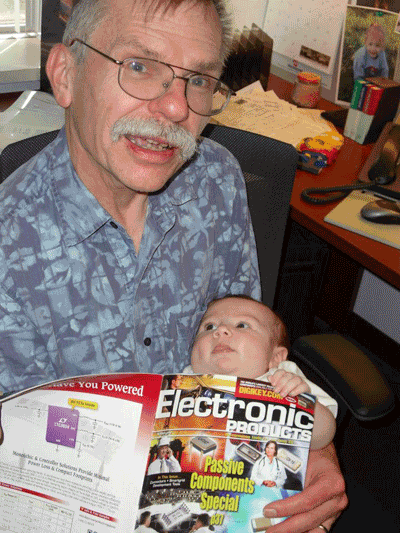Len Schiefer: righting writingLen Schiefer: righting writing
An interview with Electronic Products’ chief copy editor

Len’s fourth grandchild, Maria, recently visited him at work.
Richard Comerford: How long have you been copy editing technical writers, and how did you get started in the field?
Len Schiefer: I have been copy editing technical writers since I graduated college 38 years ago. I have a bachelor’s degree in English/American Literature from Queens College, but I owe my career to my college extracurricular activity: writing and copy editing for the school newspaper. My first professional copy-editing job I got almost by accident. Most of the copy editors at The American Institute of Physics were science majors and I was ready to leave the interview room when the personnel manager said there was one journal, The Journal of the Acoustical Society of America , that would take English majors. I was hired.
RC: In your years in the profession, what’s the most interesting story you’ve had a chance to work on?
LS: I think the most interesting stories are about the development of technology. Copy editors are essentially a story’s first reader, and I’ve had the privilege of reading about hearing loss (my very first professional assignment), plastics (at the book publisher John Wiley & Sons), and then for 28 years here the development of all sorts of electronics. I have been taught microprocessors, software, power, test and measurement, sensors . . . I’m sorry I can’t pick just one.
RC: What’s the most common mistake authors make when writing about technology?
LS: Authors sometimes write for too narrow an audience. I’ve heard many times over the years that a reader would understand some point that I questioned. Readers actually appreciate gentle reminders of background information.
RC: In the age of the Internet, how is writing and copy editing changing? Are there beneficial changes as well as negative ones?
LS: In the beginning I had no spelling or grammar checker except myself. I’m pretty good, but I appreciate the help, which is sort of analogous to a GPS for travel: it’s still a pretty good idea to have a general idea of where you are going. You really can’t replace a copy editor with a spell checker alone. You would have some very strange results.
RC: You’ve shown a keen interest in the historical impact of technology on government, and particularly the office of the President? How do you see technology affecting the current election, and what do you think of the candidates use of and attitude toward technology?
LS: The current election has been impacted by the Internet. No candidate today would be without a website or not know how to use social media. For example, President Obama from day one of his administration has demonstrated this by presiding over an upgrade to whitehouse.gov and his availability to social media, most recently reddit.com.
RC: What would you say to someone looking to follow in your career footsteps? What resources would you suggest they employ? Would you advise for or against it?
LS: My career actually was an outgrowth of what both my parents did. My dad was a television repairman, and my mom was a typist. I grew up around electronics and good English. So I guess I would say follow your upbringing. I taught my daughter and my son copy editing just by doing it around them. My daughter’s teachers in high school would remark about how professional her papers sounded. The principles of copy editing — essentially seeing that writing is logically organized and stays on point — can be applied to any field.
RC: As a person of deep religious convictions, do you see technology as enhancing and/or challenging faith?
LS: Technology enhances faith because advances in technology reveal that there is so much we humans don’t know and still have to find out about the world around us.
Advertisement
Learn more about Electronic Products Magazine





